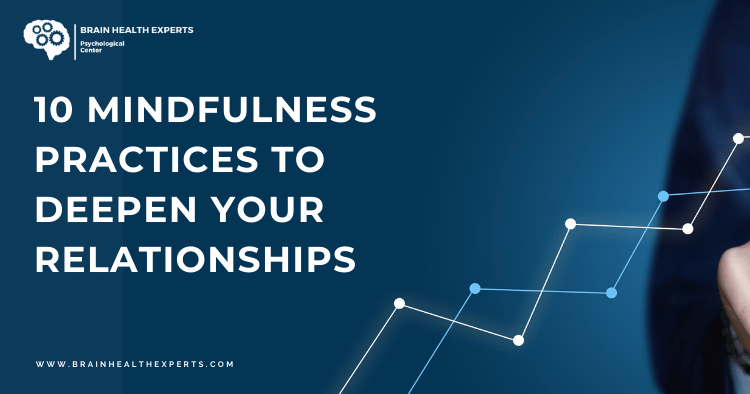Table of Contents
- Introduction
- Practice Active Listening
- Engage in Non-Judgmental Communication
- Cultivate Gratitude
- Establish a Mindful Routine
- Practice Empathy
- Create a Distraction-Free Environment
- Share Mindful Moments
- Reflect Together
- Seek Professional Guidance
- Conclusion
Introduction
In our fast-paced world, cultivating meaningful relationships can often take a backseat to our busy lives. Mindfulness, the practice of being present and fully engaged, can significantly enhance our connections with others. By incorporating mindfulness practices into our daily interactions, we can deepen our relationships, foster understanding, and nurture love. In this article, we’ll explore 10 mindfulness practices that can transform your relationships for the better.
1. Practice Active Listening
Active listening is a fundamental aspect of effective communication. It involves truly hearing what the other person is saying without planning your response while they are speaking. Here’s how to practice it:
- Stay Present: Focus entirely on the speaker. Put away your phone and other distractions.
- Reflect Back: After they finish speaking, summarize what you heard to ensure understanding.
- Ask Open-Ended Questions: Encourage further dialogue by asking questions that require more than a yes or no answer.
“Active listening is not just about hearing words; it’s about understanding the essence behind them.”
FAQ
Q: How can I improve my active listening skills?
A: Start by consciously paying attention and practicing mindfulness techniques, like focusing on your breath, before engaging in conversations. For more techniques to reduce stress during conversations, refer to 10 Proven Stress Management Techniques for Daily Relief.
2. Engage in Non-Judgmental Communication
Being non-judgmental means accepting thoughts, feelings, and experiences without criticism or evaluation. This practice fosters a safe space for open communication.
- Use “I” Statements: Focus on expressing your feelings rather than blaming others (e.g., “I feel upset when…”).
- Avoid Labels: Refrain from categorizing emotions or behaviors as “good” or “bad.” Instead, acknowledge them as they are.
“Non-judgmental communication creates a sanctuary where true feelings can be shared without fear.”
FAQ
Q: What if I struggle with non-judgmental communication?
A: It takes practice! Start small and engage in discussions where you consciously choose to refrain from making judgments.
3. Cultivate Gratitude
Gratitude can transform your perspective in relationships. By recognizing the positives in your partner or loved ones, you can enhance your emotional connection.
- Gratitude Journaling: Keep a journal where you write down things you appreciate about your partner regularly.
- Express Thanks: Make it a habit to verbally express gratitude for the little things they do.
“Gratitude is the foundation upon which love and connection are built.”
FAQ
Q: How does gratitude affect relationships?
A: Studies show that expressing gratitude can increase relationship satisfaction and foster a sense of connection. For more on how positive thinking can improve your relationships, check out 10 Ways Positive Thinking Transforms Your Relationships.
4. Establish a Mindful Routine
Creating a mindful routine can help you stay connected with your partner or loved ones. Here are some ideas:
| Mindful Activity | Description | Frequency |
|---|---|---|
| Morning Check-In | Spend 5-10 minutes each morning discussing your day ahead | Daily |
| Evening Reflection | Share one highlight and one challenge of the day | Daily |
| Weekly Dates | Dedicate time each week for a special activity together | Weekly |
“A mindful routine is like a thread that weaves together the fabric of our relationship.”
FAQ
Q: What if my partner isn’t interested in a mindful routine?
A: Start by introducing small practices and see how they respond. Share the benefits you experience to encourage participation.
5. Practice Empathy
Empathy is the ability to understand and share the feelings of others. Cultivating empathy can foster deeper connections in your relationships.
- Put Yourself in Their Shoes: Try to understand their perspective and feelings.
- Acknowledge Emotions: Validate their feelings by saying things like, “That sounds really tough.”
“Empathy bridges the gap between hearts, allowing us to connect on a deeper level.”
FAQ
Q: How can I become more empathetic?
A: Practice mindfulness meditation to increase self-awareness and improve your ability to connect with others emotionally. For more insights, see 10 Effective Emotional Regulation Techniques for Daily Life.
6. Create a Distraction-Free Environment
A cluttered environment can lead to a cluttered mind. Setting up a distraction-free environment encourages deeper conversations.
- Choose a Comfortable Space: Find a quiet, comfortable place to communicate without interruptions.
- Limit Technology: Put phones away during conversations to ensure your full attention is on each other.
“In a distraction-free environment, words become clearer, and connections become stronger.”
FAQ
Q: What if I can’t find a distraction-free space?
A: Consider scheduling quiet time together in places like parks or cafes during off-peak hours.
7. Share Mindful Moments
Engaging in activities together mindfully can strengthen your bond. Examples include:
- Mindful Eating: Share a meal where you savor each bite and discuss flavors without distractions.
- Breathe Together: Spend a few minutes breathing together, synchronizing your breaths to create a calming connection.
“Mindful moments are the gems that illuminate the path of connection.”
FAQ
Q: What are some other mindful activities we can do together?
A: Explore activities like yoga, meditation, or nature walks to connect with each other and the present moment. For more mindfulness practices, see 10 Mindfulness Practices to Reduce Stress Effectively.
8. Reflect Together
Taking time to reflect on your experiences can enhance your understanding of each other. Set aside time to discuss your feelings and thoughts about your relationship.
- Weekly Check-Ins: Use this time to discuss what’s working and what can improve in your relationship.
- Goal Setting: Work together on setting relationship goals, such as improving communication or planning more date nights.
“Reflection is a mirror that helps us see the beauty and areas for growth within our relationships.”
FAQ
Q: How can I ensure reflective conversations are productive?
A: Approach these discussions with openness and a willingness to listen without becoming defensive.
9. Seek Professional Guidance
Sometimes, seeking help from a professional can provide valuable insights and tools to strengthen your relationship. Couples therapy or workshops focused on mindfulness can be beneficial.
- Find a Qualified Therapist: Look for someone who specializes in mindfulness-based relationship counseling.
- Attend Workshops: Engage in workshops that focus on mindfulness and relationship-building. To explore workshops, check out Top 7 Stress Management Workshops 2024.
“Guidance from a professional can illuminate paths in relationships that we may not see ourselves.”
FAQ
Q: How do I approach my partner about seeing a therapist?
A: Frame it as an opportunity for growth and connection, rather than a sign of trouble.
Conclusion
Mindfulness can be a game-changer for enhancing relationships. By incorporating these 10 practices into your daily life, you’ll not only deepen your connection with your partner but also enrich all your relationships. Remember, the journey to mindfulness and connection is ongoing, so be patient with yourself and your loved ones. Embrace the present, engage fully, and watch your relationships flourish!
For more insights on mindfulness and its benefits, check out 10 Surprising Benefits of Mindfulness You Need to Know.





